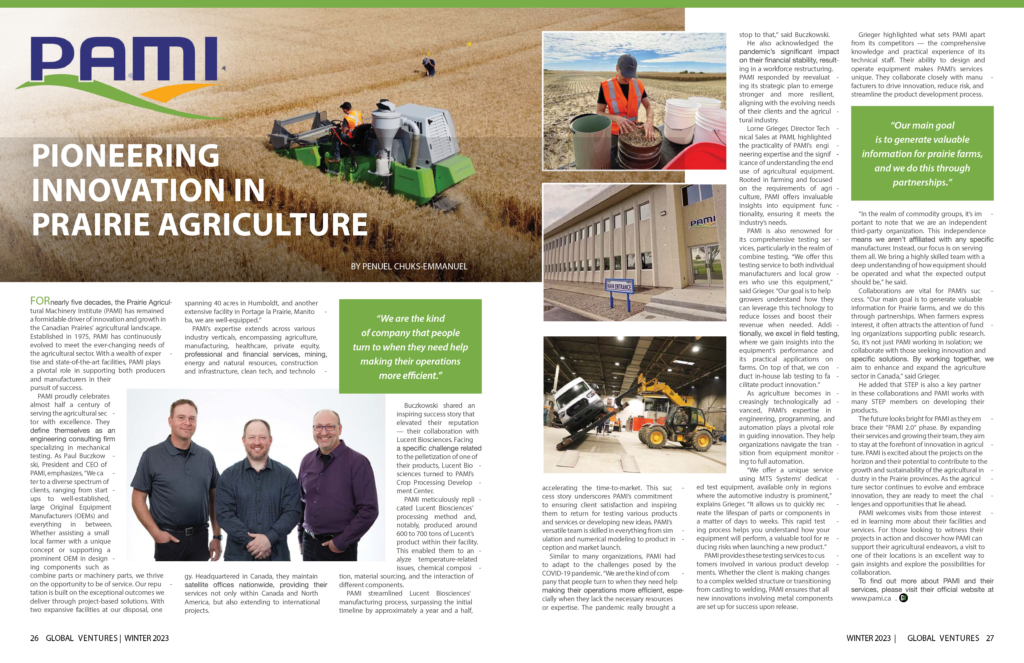Pioneering Innovation In Prairie Agriculture
BY PENUEL CHUKS-EMMANUEL
For nearly five decades, the Prairie Agricultural Machinery Institute (PAMI) has remained a formidable driver of innovation and growth in the Canadian Prairies’ agricultural landscape. Established in 1975, PAMI has continuously evolved to meet the ever-changing needs of the agricultural sector. With a wealth of expertise and state-of-the-art facilities, PAMI plays a pivotal role in supporting producers and manufacturers in their pursuit of success.
PAMI proudly celebrates almost half a century of serving the agricultural sector with excellence. They define themselves as an engineering consulting firm specializing in mechanical testing. As Paul Buczkowski, President and CEO of PAMI, emphasizes, “We cater to a diverse spectrum of clients, ranging from startups to well-established, large Original Equipment Manufacturers (OEMs) and everything in between. Whether assisting a small local farmer with a unique concept or supporting a prominent OEM in designing components such as combine parts or machinery parts, we thrive on the opportunity to be of service.
Our reputation is built on the exceptional outcomes we deliver through project-based solutions. With two expansive facilities at our disposal, one spanning 40 acres in Humboldt, and another extensive facility in Portage la Prairie, Manitoba, we are well-equipped.” PAMI’s expertise extends across various industry verticals, encompassing agriculture, manufacturing, healthcare, private equity, professional and financial services, mining, energy and natural resources, construction and infrastructure, clean tech, and technology. Headquartered in Canada, they maintain satellite offices nationwide, providing their services not only within Canada and North America, but also extending to international projects.
Buczkowski shared an inspiring success story that elevated their reputation — their collaboration with Lucent Biosciences. Facing a specific challenge related to the pelletization of one of their products, Lucent Biosciences turned to PAMI’s Crop Processing Development Center. PAMI meticulously replicated Lucent Biosciences’ processing method and, notably, produced around 600 – 700 tons of Lucent’s product within their facility. This enabled them to analyze temperature-related issues, chemical composition, material sourcing, and the interaction of different components. PAMI streamlined Lucent Biosciences’ manufacturing process, surpassing the initial timeline by approximately a year and a half, accelerating the time-to-market.
This success story underscores PAMI’s commitment to ensuring client satisfaction and inspiring them to return for testing various products and services or developing new ideas. PAMI’s versatile team is skilled in everything from simulation and numerical modeling to product inception and market launch. Similar to many organizations, PAMI had to adapt to the challenges posed by the COVID-19 pandemic. “We are the kind of company that people turn to when they need help making their operations more efficient, especially when they lack the necessary resources or expertise. The pandemic really brought a stop to that,” said Buczkowski.
He also acknowledged the pandemic’s significant impact on their financial stability, resulting in a workforce restructuring. PAMI responded by reevaluating its strategic plan to emerge stronger and more resilient, aligning with the evolving needs of their clients and the agricultural industry. Lorne Grieger, Director Technical Sales at PAMI, highlighted the practicality of PAMI’s engineering expertise and the significance of understanding the end use of agricultural equipment. Rooted in farming and focused on the requirements of agriculture, PAMI offers invaluable insights into equipment functionality, ensuring it meets the industry’s needs.
PAMI is also renowned for its comprehensive testing services, particularly in the realm of combine testing. “We offer this testing service to both individual manufacturers and local growers who use this equipment,” said Grieger. “Our goal is to help growers understand how they can leverage this technology to reduce losses and boost their revenue when needed. Additionally, we excel in field testing, where we gain insights into the equipment’s performance and its practical applications on farms.
On top of that, we conduct in-house lab testing to facilitate product innovation.” As agriculture becomes increasingly technologically advanced, PAMI’s expertise in engineering, programming, and automation plays a pivotal role in guiding innovation. They help organizations navigate the transition from equipment monitoring to full automation.
“We offer a unique service using MTS Systems’ dedicated test equipment, available only in regions where the automotive industry is prominent,” explains Grieger. “It allows us to quickly recreate the lifespan of parts or components in a matter of days to weeks. This rapid testing process helps you understand how your equipment will perform, a valuable tool for reducing risks when launching a new product.” PAMI provides these testing services to customers involved in various product developments. Whether the client is making changes to a complex welded structure or transitioning from casting to welding, PAMI ensures that all new innovations involving metal components are set up for success upon release.
Grieger highlighted what sets PAMI apart from its competitors — the comprehensive knowledge and practical experience of its
technical staff. Their ability to design and operate equipment makes PAMI’s services unique. They collaborate closely with manufacturers to drive innovation, reduce risk, and streamline the product development process. “In the realm of commodity groups, it’s important to note that we are an independent third-party organization. This means that we aren’t affiliated with any specific manufacturer. Instead our focus is on serving them all. We bring a highly skilled team with a deep understanding of how equipment should be operated and what the expected output should be,” he said.
Collaborations are vital for PAMI’s success. “Our main goal is to generate valuable information for Prairie farms, and we do this through partnerships. When farmers express interest, it often attracts the attention of funding organizations supporting public research. So, it’s not just PAMI working in isolation; we collaborate with those seeking innovative and specific solutions.
By working together, we aim to enhance and expand the agriculture sector in Canada.” said Grieger. He added that STEP is also a key partner in these collaborations and PAMI works with many STEP members on developing their products. The future looks bright for PAMI as they embrace their “PAMI 2.0” phase. By expanding their services and growing their team, they aim to stay at the forefront of innovation in agriculture. PAMI is excited about the projects on the horizon and their potential to contribute to the growth and sustainability of the agriculture industry in the Prairie provinces.
As the agriculture sector continues to evolve and embrace innovation, they are ready to meet the challenges and opportunities that lie ahead. PAMI welcomes visits from those interested in learning more about their facilities and services. For those looking to witness their projects in action and discover how PAMI can support their agriculture endeavors, a visit to one of their locations is an excellent way to gain insights and explore the possibilities for collaboration.
Find the full Global Ventures magazine here:
https://sasktrade.com/global-ventures/winter-edition-2023/t

